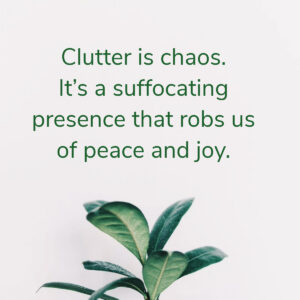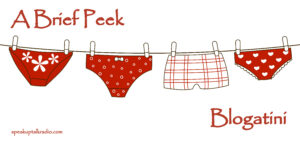Clutter: Edit Your Tchotchkes by Pat Rullo

From overflowing closets to jam-packed garages, clutter is often an unwelcome companion. Clutter goes far beyond simply being an aesthetic issue. Research and common sense suggest clutter can significantly impact physical and mental health.
I am not a clutter person by nature, although sometimes, certain spaces do get messy. When we experienced a dozen midnight tornadoes and three earthquakes a few weeks ago, we lost power for several days when two old oak trees fell on the power lines. At first, I felt lost without the Internet and the ability to work online. But soon, I had no choice but to acquiesce and find something productive to do.
I now have bathroom drawers that are clean and mostly empty. Old sheets and towels in the linen closet – gone! Desktop – sparse. Pantry – organized. Closet – arranged by season and color. So, this feeling of weightlessness caused me to think beyond the aesthetic and consider the health ramifications of clutter.
One of the most significant impacts of clutter is increased stress levels. Living in a cluttered environment can make us feel overwhelmed and anxious, leading to higher stress hormone levels like cortisol. High cortisol can cause symptoms associated with “fight or flight,” which creates all kinds of issues – weight gain, acne, fatigue … The constant visual reminder of unfinished tasks or the inability to find what we need generates a continuous source of mental strain. When I was a child, my mother often insisted that my brother and I clean our rooms. Ugh! But I still remember the feeling of airiness and lightness after the fact. It was exhilarating in an unexplainable way. My room just felt so good.
Cluttered spaces often contribute to poor mental health. A chaotic environment can make it difficult to focus and concentrate, decreasing productivity. It can also trigger guilt and shame, as some may perceive their clutter as a personal failing. Furthermore, research has linked clutter with higher rates of depression and anxiety, suggesting that a cluttered home can negatively impact mental well-being.
Clutter provides an ideal breeding ground for dust mites, mold, and other allergens. Excessive material possessions make cleaning and dusting challenging, leading to a buildup of allergens in the air. This can trigger or worsen allergies and respiratory issues such as asthma, causing discomfort and potential long-term health problems. Instead of dusting around small items, edit your tchotchkes.
Clutter can disrupt sleep patterns and negatively impact the quality of rest. A cluttered bedroom makes it impossible to create a calm and peaceful atmosphere while silently challenging our ability to fall and stay asleep. Sleep disturbances can lead to fatigue, weakened immune systems, and decreased overall well-being. I went on a better sleep mission and removed everything except a bed, chair, and the overhead lighting fixture. Pictures on the wall are unnecessary. Who looks at pictures and knick-knacks while sleeping anyway? No phones, no lamps, nothing but a fresh, clean bed for sleep. It’s my night-time sanctuary.
Living in a cluttered environment can negatively impact cognitive functioning. Studies have found that excess clutter competes for our attention and overloads our brains, reducing our ability to concentrate, stay organized, and make decisions effectively. This can lead to decreased cognitive performance, memory, and problem-solving skills. And who wants that?
Depending on the level of clutter, there are physical ramifications too. Cluttered spaces increase the risk of accidents and injuries. Tripping over items, knocking things off shelves, or struggling to navigate through crowded areas can result in falls, bruises, and other physical harm. These accidents cause immediate damage and can lead to lasting injuries, chronic pain, or disability.
Clearly, clutter is chaos. It’s a suffocating presence that robs us of peace and joy. So don’t wait for earthquakes, tornadoes, lost power, or no Internet. Take some active time to improve your health and practice minimalism. Edit your tchotchkes. Get rid of that clutter.
PR
